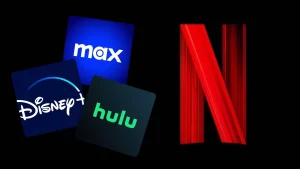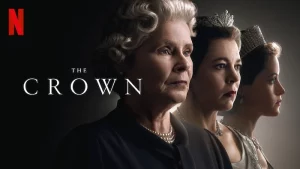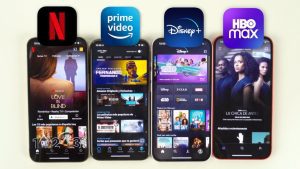Introduction
Streaming services have transformed the entertainment industry, offering viewers convenience, variety, and accessibility. From how we watch movies to how content is produced, the rise of platforms like Netflix, Amazon Prime, and Disney+ has disrupted traditional entertainment systems. This article explores the key ways streaming services have reshaped the industry, analyzing their benefits and challenges.
The Rise of Streaming Services

Streaming services have become a major part of how we enjoy entertainment today. Platforms like Netflix, Amazon Prime, and Disney+ have changed the way people watch movies, TV shows, and other content. Instead of relying on cable TV or going to the cinema, people can now watch their favorite content anytime and anywhere, as long as they have an internet connection. This change has made streaming services incredibly popular around the world.
How Streaming Services Revolutionized Content Consumption

Streaming services have made it easier than ever to access entertainment. Unlike traditional cable or cinema systems, they offer on-demand content that users can watch anytime, anywhere. This shift has empowered viewers with greater control over their entertainment choices.
Key Features of Streaming Services:
- Accessibility: Watch on multiple devices from anywhere.
- Diverse Content: From movies and TV shows to documentaries and live sports.
- Ad-Free Options: Paid subscriptions provide uninterrupted viewing.
Streaming platforms prioritize user preferences through algorithms, helping viewers discover personalized content easily. This focus on convenience has significantly increased their popularity.
The Benefits of Streaming Services
One of the biggest advantages of streaming services is the convenience they offer. People can watch what they want, when they want, without having to deal with TV schedules. With streaming, users have access to a huge library of movies, TV shows, and documentaries. This gives viewers a wide variety of content to choose from, all for a relatively low monthly fee. In addition, many streaming services offer ad-free options, providing an uninterrupted viewing experience.
The Role of Streaming Services in Content Creation

Streaming services are not just about watching content; they also play an important role in creating new content. Many platforms now produce their own original movies and TV shows, such as Netflix’s Stranger Things and Amazon Prime’s The Boys. These original programs have raised the bar for storytelling, offering fresh and exciting content that might not have been possible through traditional TV networks. Streaming services have given creators more freedom to produce diverse, unique, and high-quality shows.
The Decline of Traditional Entertainment Systems
The growth of streaming services has challenged traditional entertainment providers such as cable TV and cinemas. Many consumers now prefer affordable, flexible subscription models over expensive cable packages or ticketed events.
Impact on Traditional Providers:
- Decrease in cable TV subscriptions (cord-cutting trend).
- Reduced cinema attendance due to home viewing options.
- Rising competition for exclusive content and rights.
While traditional systems are still relevant, they must adapt to survive in this evolving landscape.
How Streaming Services Are Transforming Content Production

Streaming platforms have changed not only how content is consumed but also how it is created. Companies now invest in original programming, giving rise to high-quality shows and movies. This shift has led to increased diversity in storytelling and representation.
Advantages of Streaming in Content Production:
- Creative Freedom: Platforms often allow creators to take risks with unique ideas.
- Global Reach: Content from one country can reach a worldwide audience.
- Shorter Production Cycles: Faster releases compared to traditional systems.
This transformation has empowered creators and given viewers a more extensive range of choices.
How Streaming Services Changed Watching Habits
Before streaming, people had to watch shows and movies at specific times or go to a cinema to see the latest films. With streaming, viewers now have the freedom to watch content whenever it fits into their schedule. This flexibility has made watching TV much easier and more convenient. Whether you’re at home, traveling, or on a lunch break, streaming services allow you to enjoy entertainment on your own time.
The Rise of Subscription-Based Models

Most streaming platforms operate on a subscription-based model, where users pay a monthly fee for access to content. This has become a popular business model because it provides steady revenue for companies. Instead of relying on ad-based revenue like traditional TV, streaming services offer ad-free or minimal ads in exchange for a subscription fee. This setup works well for viewers who don’t want to be interrupted by commercials and for companies that want predictable income.
The Growth of Exclusive Content

One of the biggest reasons for the rise of streaming platforms is the amount of exclusive content they offer. Streaming services like Netflix, Hulu, and Amazon Prime have invested heavily in creating original shows and movies that can only be found on their platforms. These exclusive programs, like The Crown on Netflix or The Marvelous Mrs. Maisel on Amazon Prime, attract subscribers who want access to content they can’t find anywhere else. This push for unique content has transformed the entertainment industry, shifting the focus from traditional TV networks to online platforms.
The Impact on Traditional TV and Movie Theaters

Streaming services have also had a big impact on traditional TV and movie theaters. More people are canceling their cable subscriptions, a trend known as “cord-cutting,” because they prefer the on-demand flexibility that streaming offers. Similarly, movie theaters have seen a drop in attendance as more people choose to watch the latest films at home. Some streaming platforms, like Netflix, are even releasing movies directly on their services, making it easier for viewers to watch new films without leaving their homes.
Affordable Options for Viewers
Another reason streaming services are so popular is their affordability. Compared to expensive cable subscriptions or buying tickets for multiple movies, streaming services offer a much cheaper alternative. For a low monthly fee, users can access a wide range of content, often with multiple viewing options like HD and 4K. The ability to share accounts with family members or friends also helps make streaming even more cost-effective.
Streaming Services and Global Access

One of the biggest advantages of streaming services is their ability to reach a global audience. People from all around the world can access content that was once limited to specific regions or countries. Whether it’s an American show available in Europe or an international film reaching viewers in the United States, streaming services have opened up new opportunities for both content creators and viewers. This global reach has helped introduce new cultures, languages, and stories to a broader audience.
The Growing Competition in the Streaming Market

As streaming services continue to grow, competition between platforms is becoming fierce. New services are constantly being introduced, and established platforms are trying to keep their subscribers by offering better content, lower prices, or more features. This intense competition has led to a “streaming wars” scenario, where platforms fight to secure the rights to popular shows, movies, and even sports events. For consumers, this competition can be a good thing, as it encourages companies to improve their services and offer more value. However, it can also lead to subscription overload, where viewers have to subscribe to multiple platforms to access all the content they want.
Challenges Faced by Streaming Services
Despite their success, streaming services face some challenges. The market is becoming crowded with many different platforms, which can make it hard for viewers to choose which service to subscribe to. Also, the cost of multiple subscriptions can add up, leading to “subscription fatigue.” In addition, piracy remains a significant issue for streaming companies, as unauthorized sharing of content reduces their profits. As competition grows, streaming platforms will need to find new ways to keep their audience engaged and loyal.
Despite their growth, streaming platforms face several challenges:
- Saturation of Platforms: The market is crowded, leading to fierce competition.
- Content Fatigue: Viewers may struggle to choose from an overwhelming selection.
- Piracy Issues: Unauthorized content sharing affects revenue.
- Rising Costs: Subscription fatigue as consumers pay for multiple services.
Streaming services must innovate to address these issues and retain their audience.
Future Trends in Streaming Entertainment

The future of streaming looks exciting. As technology continues to evolve, we can expect streaming services to offer even more personalized experiences. Features like artificial intelligence (AI) will help recommend content based on individual preferences, and interactive shows where viewers can choose the storyline will become more common. Streaming services may also continue to expand into live events, such as sports and concerts, to attract more viewers. With new trends and technologies, the way we watch entertainment will keep changing in the years to come.
The future of streaming services will focus on advanced technologies and consumer-centric innovations. AI-driven content recommendations, interactive storytelling, and virtual reality integration are expected to enhance viewer experiences.
Emerging Trends:
- Interactive Content: Viewers can shape story outcomes.
- Live Streaming: Growth in real-time sports, concerts, and events.
- Localized Content: Focus on regional languages and cultures.
- Sustainability: Eco-friendly streaming technologies.
Analysis Table: Impact of Streaming Services
| Factor | Before Streaming Services | After Streaming Services |
|---|---|---|
| Content Accessibility | Limited to cable TV and cinemas | Anytime, anywhere on multiple devices |
| Pricing | Expensive subscriptions or tickets | Affordable monthly plans |
| Content Variety | Limited programming | Diverse global content |
| Control Over Viewing | Scheduled programming | On-demand, personalized viewing |
Comparative Table: Streaming vs. Traditional Entertainment
| Aspect | Streaming Services | Traditional Systems |
|---|---|---|
| Convenience | High (on-demand, multi-device) | Low (fixed schedules, single device) |
| Affordability | Flexible subscription options | Often costly (cable packages, tickets) |
| Content Library | Expansive, global access | Limited to local/regional offerings |
| Audience Reach | Global | Regional/local |
| Adaptability | Rapid technological integration | Slow adaptation |
Conclusion
Streaming services have completely changed how we enjoy entertainment, from movies and TV shows to live events and even education. They offer convenience, affordability, and endless choices, making them a favorite for people worldwide. However, challenges like competition, choice overload, and environmental concerns remain. As streaming platforms continue to evolve and adopt new technologies, their role in our daily lives will only grow. Streaming is more than just a trend—it’s the future of entertainment.












